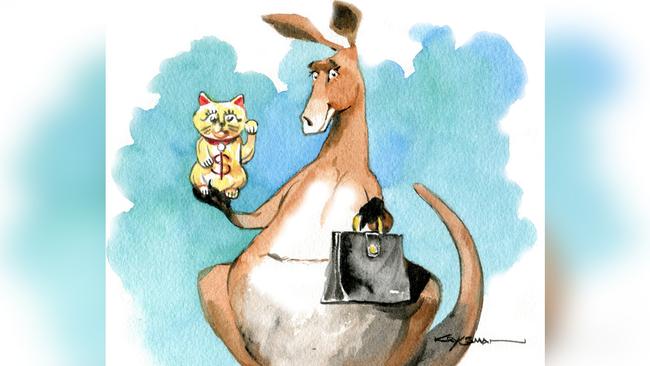China market a heady mix of challenges and opportunities
It has been a big week for Australian business in China, with Xi Jinping’s massive import expo luring a who’s who of business.

It has been a big week for Australian business in China, with almost anyone who is anyone in the Australia-China business scene in Shanghai for President Xi Jinping’s massive import expo.
Trade Minister Simon Birmingham’s first visit to China was given an added impetus with the unexpected news that it will be quickly followed by tomorrow’s visit to Beijing by Foreign Minister Marise Payne, the first by an Australian foreign minister to China since February 2016.
Executives in Shanghai this week include Fortescue Metals chief Elizabeth Gaines, Australia Post CEO Christine Holgate, Tourism Australia boss John O’Sullivan, and Blackmores chief executive Richard Henfrey and director Marcus Blackmore.
Queensland Premier Annastacia Palaszczuk is here, along with members of the Queensland Ballet, which begins a China tour in Shanghai on Friday night.
Former Victorian premier John Brumby is here in his role as president of the Australian China Business Council and is also representing the Victorian government, which is now in caretaker mode given its upcoming election, as is a range of state government ministers.
Add in representatives from a host of other companies including Coles, Woolworths, BHP, Rio, a2 Milk and Treasury Wine Estates, as well as Patrick Hutchinson, chief executive of the Australian Meat Industry Council, former Trade Minister Andrew Robb, who is now a China business consultant, Australia’s Ambassador to China Jan Adams, and Longtable Group chief executive Laura McBain — not to mention representatives from AFL teams Port Adelaide and St Kilda, which will clash in Shanghai next June — and it has been a heady mix.
The Australian also got to meet a Chinese-born beekeeper who is now living in Western Australia exporting his honey back to China. And today Birmingham will witness several major memorandums of understanding between Australian and Chinese companies for deals estimated to be worth $15 billion.
After more than a year of tensions in the political relationship, tensions that have concerned the Australia-China business community, there has been a sense of relief in Shanghai this week that Australian companies can get on with doing business.
For those in the Australia-China business sector — which is now worth more than $180bn in two-way trade in goods and services — the tone of the political relationship between the governments does matter.
Business is now hoping that the visits by Birmingham and Payne could be followed one by Scott Morrison, hopefully fitting it into the Prime Minister’s busy diplomatic schedule between now and the end of the year.
The improving political relationship is welcome, although it is still apparent Beijing-Canberra ties will continue to face challenges given a more security-conscious new world order.
There are many opportunities for business in China in a range of areas from mining, food and beverage, healthcare products, tourism and education.
But it should not be forgotten that doing business in China still remains sheer hard work.
The latest Doing Business in China report released yesterday by the Australia China Business Council and the China-Australia Chamber of Commerce in China (AustCham) should be read by any company doing business in China or thinking about it.
Its survey of 165 companies doing business with China moves away from the “1.2 billion people, booming middle class” rhetoric and drills down into the serious day-to-day challenges facing companies doing business in the world’s second-largest economy.
The report makes clear that business ties do have the potential to be affected by future political tensions.
In addition to rising wages, increasing inflation, talent shortages, the prospect of a slowing economy, changing regulations and increasing attention from government authorities — and the opaqueness of many upcoming legislative changes in China — are all part of the challenges for anyone doing business here.
The market is probably the most competitive in the world with world’s best practice suppliers from North America, Europe and the rest of Asia all furiously pitching their wares to one of the world’s biggest consumer markets — along with increasingly sophisticated Chinese companies.
It’s a tough, stressful business, which needs close attention and serious boots on the ground.
As AustCham Beijing chairman, KPMG China’s Vaughn Barber, put it in the report: “Sometimes it seems there are two stories about the Australia-China relationship. One is a story of promise and opportunity; the other a narrative of challenge and suspicion.”
Australian investors, executives and observers need to recognise that China is not a pot of gold at the end of a rainbow nor easy pickings.
Along with its massive opportunities come serious business difficulties and the challenge of dealing with an opaque one-party government system that operates to the beat of its own drum.
All that said, as the report shows, most of the companies surveyed see their China business as both an important source of potential growth and their most important offshore market.
Things have moved on in the Australia-China relationship in a positive way this week, but Xi’s massive import expo also highlights the fact that there are at least 80 other countries fiercely determined to do business in China that have also had country pavilions at the Shanghai expo.
Xi has made it clear he intends to continue to open up the China market to foreign businesses.
For Australia, developing a realistic understanding of both the challenges and opportunities of doing business with our largest trading partner in a more complex world political and economic order will be the key to the country’s future economic success.




To join the conversation, please log in. Don't have an account? Register
Join the conversation, you are commenting as Logout